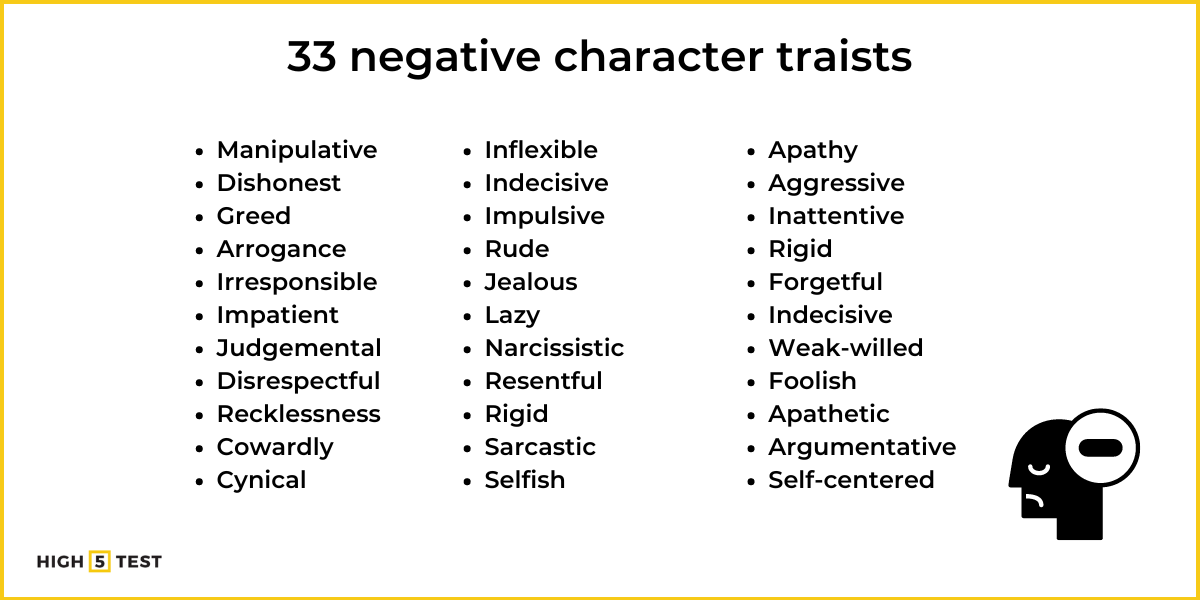Each person has negative traits they want to improve, such as laziness or impulsivity. The first step is recognizing these traits or behaviors and making a commitment to improving them. With the HIGH5 Strengths Test, you can uncover how these perceived negative traits or behaviors could actually be indicative of underlying strengths, like strategic thinking or dynamic energy, which when properly managed, can lead to personal growth and greater success at work.
Psychologists and coaches often rely on negative personality traits or behaviors in order to help people identify their weaknesses, discover negative attributes that deserve our attention, and focus on development.
Making a commitment to changing these negative behaviors or traits is only possible if you realize their impacts on your well-being and/or career and start working on improving them. In this article, we will introduce and discuss the common pitfalls and negative behaviors or attributes ultimately impacting interpersonal relationships and the workplace.
Pro Tip From HIGH5
Before diving into this particle, you can identify which of your traits you’ve viewed negatively and use the HIGH5 test to explore their underlying strengths. This can drastically change your perspective on your personal challenges and highlight areas for growth.
What are the negative qualities?
Negative qualities, as well as positive qualities, are an integral part of the personality. The American Psychological Association (APA) defines personality as a relatively stable set of unique individual characteristics and dispositions that organize and influence their feelings, thoughts, and behaviors.
Personality assessments such as the Big Five are focused on the basic factors in personalities such as Extraversion, Agreeableness, Openness, Conscientiousness, and Neuroticism. However, these personality factors are rather neutral.
According to the Myers-Briggs Type Indicator, there are sixteen different personality types, including ESTJ, INTP, and many others. These acronyms are a sum of four major personality traits: Extraversion (E) – Introversion (I), Sensing (S) – Intuition (N), Thinking (T) – Feeling (F), Judging (J) – Perceiving (P).

But none of these types of personality traits are completely negative or positive. Negative qualities or behaviors can be defined as personality signs that lead to negative emotions and create a negative overall perception of a person.
Negative qualities are almost similar to character weaknesses such as shyness, lack of confidence, self-criticism, or arrogance. Negative character traits or behaviors are those that don’t allow us to reach our goals and use our full potential either in social relationships or at the workplace. Moreover, exhibiting these traits or behaviors as leaders greatly reduces effectiveness in the workplace, leading to employee burnout, higher turnover rates, and reduced employee engagement (1). Here is the list of the most common negative character traits that need our attention.
7 most common negative behaviors or character traits
- Rude
- Egocentric
- Greedy
- Biased
- Aggressive
- Disrespectful
- Manipulative
Rudeness
Unfortunately, this negative personality trait is common in modern society. People who are rude to others have impolite or bad manners and may refuse to conform to what society says. Even if something is their fault, they never seem to care about apologizing or saying “Excuse me.” They aren’t interested in personal development and are characterized by violent or harsh behaviors.
Egocentricity
This negative behavior or trait describes the inability to understand others’ points of view and look at the world from one’s own perspective. Egocentric people are unable to imagine that other people have different opinions and their opinions also matter. Instead, they focus on themselves completely and act selfishly sometimes. Looking at this from a leadership perspective, individuals buy into the leader first and then buy into his/her vision, so it’s critical for leaders to understand their employees’ perspectives (2).
Greed
People with this character trait or behavior tend to try to get all they can out of other people without thought or care for the other person. They have a desire to gain all the wealth and power and want more, no matter how much you give them. Sometimes, greed is defined as a natural human impulse to collect useful resources. Those individuals exhibiting greedy behaviors feel disappointed when others don’t serve them and don’t satisfy their needs.
Bias
People with biased personality traits or behaviors are perceived as negative people. They tend to stick to their own attitude, thoughts, or perspectives. They subjectively assess people and events around them and don’t rely on objective information that’s available in the environment. They favor one side over another and view themselves as right even when they don’t have facts that would back up their claims.
Aggressive
People with aggressive personalities or behaviors tend to have hostile or violent behavior and disregard others’ rights. People with this personality trait rely on their primitive impulses, threaten others, or may make others feel unsafe. Aggressiveness is defined as a “general propensity to engage in acts of physical and verbal aggression”. It’s critical for everyone to feel safe in the workplace.
Disrespect
People with this character trait or behavior don’t respect others’ opinions and needs. They are typically impolite WHO refuse to conform to social norms and reveal criticism in social relationships. Usually, they don’t care about honesty or loyalty.
Manipulative
Manipulative individuals can have a harmful influence over others. They use other people to get what they want and feel proud of their ability to control others. Those individuals who behave in a manipulative way usually attack others’ mental and emotional sides and make them act or feel a certain way.
Full list with 33 negative character traits
- Manipulative
- Dishonest
- Greed
- Arrogance
- Irresponsible
- Impatient
- Judgemental
- Disrespectful
- Recklessness
- Cowardly
- Cynical
- Inflexible
- Indecisive
- Impulsive
- Rude
- Jealous
- Lazy
- Narcissistic
- Resentful
- Rigid
- Sarcastic
- Selfish
- Apathy
- Aggressive
- Inattentive
- Rigid
- Forgetful
- Indecisive
- Weak-willed
- Foolish
- Apathetic
- Argumentative
- Self-centered

Manipulative
Manipulative people use others to achieve their own goals, often through deceit and exploitation. They control and influence others for personal gain without regard for their feelings.
Dishonest
Dishonest individuals frequently lie or deceive others. They lack integrity and trustworthiness, making it hard for others to rely on them.
Greed
Greedy people have an insatiable desire for more, whether it’s money, power, or possessions. They prioritize their own gain over others’ needs.
Arrogance
Arrogant individuals have an inflated sense of self-importance. They often belittle others and are unwilling to consider other viewpoints.
Irresponsible
Irresponsible people neglect their duties and fail to follow through on commitments. They often cause problems for themselves and others due to their lack of reliability.
Impatient
Impatient individuals struggle to wait for things and often want immediate results. They can be easily frustrated and may rush tasks, leading to mistakes.
Judgemental
Judgmental people are quick to criticize others without understanding their situations. They often make unfair assessments based on limited information.
Disrespectful
Disrespectful individuals do not show consideration or courtesy to others. They often belittle, insult, or disregard the feelings and rights of others.
Recklessness
Reckless people act without considering the consequences of their actions. Their behavior can be dangerous to themselves and others.
Cowardly
Cowardly individuals avoid taking risks and facing challenges due to fear. They often lack the courage to stand up for themselves or others.
Cynical
Cynical people have a pessimistic outlook and often distrust others’ motives. They believe that people are generally selfish and insincere.
Inflexible
Inflexible individuals are unwilling to adapt to new situations or ideas. They rigidly adhere to their own ways and resist change.
Indecisive
Indecisive people struggle to make decisions and often second-guess themselves. This can lead to missed opportunities and frustration.
Impulsive
Impulsive individuals act on their immediate desires without thinking things through. Their hasty decisions can lead to unintended consequences.
Rude
Rude people display a lack of manners and consideration for others. They often behave disrespectfully and can offend those around them.
Jealous
Jealous individuals feel envious of others’ achievements, possessions, or relationships. This emotion can lead to resentment and insecurity.
Lazy
Lazy people avoid effort and responsibility, preferring to do as little as possible. Their lack of motivation can hinder personal and professional growth.
Narcissistic
Narcissistic individuals have an excessive interest in themselves and their appearance. They often seek admiration and have little regard for others’ feelings.
Resentful
Resentful people hold onto feelings of bitterness and anger over perceived wrongs. This can lead to ongoing grudges and negative interactions.
Rigid
Rigid individuals are unwilling to be flexible or open-minded. They stick strictly to their own rules and resist new ideas.
Sarcastic
Sarcastic people use irony and mockery to convey contempt. Their remarks can be hurtful and undermine positive communication.
Selfish
Selfish individuals prioritize their own needs and desires above those of others. They often lack consideration for how their actions affect others.
Apathy
Apathetic people show a lack of interest, enthusiasm, or concern. They are often disengaged and indifferent to what is happening around them.
Aggressive
Aggressive individuals exhibit hostile or violent behavior. They often assert themselves in a forceful and intimidating manner.
Inattentive
Inattentive people struggle to focus and often miss important details. Their lack of attention can lead to mistakes and misunderstandings.
Forgetful
Forgetful individuals frequently fail to remember things. This trait can lead to missed appointments and unfulfilled responsibilities.
Weak-willed
Weak-willed people have difficulty sticking to their decisions and goals. They easily give in to temptation or pressure from others.
Foolish
Foolish individuals make poor decisions due to a lack of good judgment. Their actions often lead to negative consequences.
Apathetic
Apathetic people show little interest or concern for things that typically matter to others. Their lack of enthusiasm can be disengaging.
Argumentative
Argumentative individuals often engage in disputes and enjoy contradicting others. They frequently provoke disagreements and conflict.
Self-centered
Self-centered people focus excessively on their own needs and interests. They often disregard others’ perspectives and needs.
Types of negative traits
People usually have complex sets of negative character traits. Some of our negative personality signs are revealed in social relationships, while others hinder us from growing our personality or reaching our career goals. Generally, negative traits can be divided into negative interpersonal and intellectual traits.
Negative Interpersonal & Intellectual Traits
Negative interpersonal and intellectual traits and behaviors are revealed in the process of communication with other people, both personally and professionally and with completing work products. Before we can tackle how to implement changes in your responses and interactions with others, it’s important to understand the interpersonal and intellectual traits and behaviors that are considered negative. Moreover, after learning them, it’s critical to complete an honest evaluation of your strengths and weaknesses before developing a plan to change.
Examples of negative interpersonal traits
- Apathetic
- Argumentative
- Cowardly
- Impulsive
- Self-centered
- Dishonest
- Jealous
- Sarcastic
- Arrogant
Examples of negative intellectual traits
- Inattentive
- Lazy
- Rigid
- Irresponsible
- Forgetful
- Impatient
- Indecisive
- Inflexible
- Weak-willed
- Foolish
How do I implement change for negative qualities?
Accepting negative traits is crucial, but understanding them and committing to change can be transformative. The HIGH5 strengths test helps you dive deeper into these traits, showing how what might seem like impulsivity could actually reflect a capacity for rapid decision-making. This deeper understanding can inspire you to harness these traits positively, enhancing both self-concept and personal efficacy.
However, the desire to change our personality or behaviors is natural. For example, introverted people might wish to be more sociable, or impulsive people might wish to control their emotions better. This is a clear case of seeking first to understand and then working to be understood (3). Personality traits are fixed throughout our lives, but as psychologists prove, changing your negative qualities and behaviors and turning them into positive ones is possible. In fact, longitudinal studies show that personality gets better over time.
The first step in this journey is to identify personality traits or behaviors you wish to change. Moreover, you can identify your negative character traits, discover positive traits you wish to develop, and be more observant of your thoughts, emotions, and behaviors. By understanding personality traits and focusing on desired personal qualities, you can develop character strengths and integrate them into your existing sets of personality traits.
Pro Tip From HIGH5
After taking the HIGH5 test, list your top five strengths alongside your negative traits. Consider practical ways you can use your strengths to mitigate or transform these negative traits into something constructive.
Negative workplace behaviors and traits
Awareness of negative qualities is just the beginning; transforming them is key to professional advancement and success. The HIGH5 strengths test identifies your unique strengths and shows how they can mitigate or even capitalize on your workplace challenges. For example, maybe you have a tendency to be ‘careless’. This may be reframed as a propensity for innovation, encouraging you to channel this trait into creative problem-solving. Moreover, interviewers may ask you about negative qualities in the process of job interviews.
Here are some of the most common negative qualities that might slow down your progress at the workplace.
10 negative workplace behaviors and traits
- Shy
- Untimely
- Careless
- Irresponsible
- Narrow-minded
- Unfocused
- Bossy
- Disloyal
- Nervous
- Unpredictable
Pro Tip From HIGH5
Discuss your HIGH5 strengths with your manager to find roles or tasks that align better with your natural abilities, turning potential workplace negatives into opportunities for success and satisfaction.
Surprisingly positive traits that sound negative at first!
Labeling traits and behaviors solely as negative often overlooks their potential. By using the HIGH5 test, you can discover how characteristics typically seen as drawbacks, like skepticism or reservedness, can actually be assets. This nuanced understanding helps you leverage these traits strategically, both in personal relationships and at work.
For example, even when being ambitious is considered something bad, ambition helps us to achieve our goals. Similarly, being sensitive could slow down your progress at work or cause interpersonal issues, but it also means that you’re empathetic towards people. Here is the list of surprisingly positive traits that sound negative at first.
- Ambitious
- Sensitive
- Procrastinator
- Neurotic
- Pessimistic
- Messy
- Cynical
Pro Tip From HIGH5
Regularly challenge yourself to reframe a negative trait as a strength in professional scenarios. For example, if ‘impatience’ is a trait, consider how this can be utilized to drive quick decision-making in fast-paced project environments.
What about neutral personality traits?
The majority of personality traits aren’t 100% negative or positive. There are plenty of neutral personality traits that receive either good or bad connotations depending on the context. Some of the most common neutral personality traits are:
- Observant
- Cautiousness
- Self-reserved
- CuriousStylish
- FlexibleStrange
- Serious
How do I change my negative qualities into positive qualities?
Accepting negative traits is crucial, but understanding them is transformative. The HIGH5 strengths test helps you delve deeper into these traits, showing how what might seem like impulsivity could actually reflect a capacity for rapid decision-making. This deeper understanding can inspire you to harness these traits positively, enhancing both self-concept and personal efficacy.
However, the desire to change our personality is natural. For example, introverted people might wish to be more sociable, or impulsive people might wish to control their emotions better. Personality traits are fixed throughout our lives, but as psychologists prove, changing your negative qualities and turning them into positive ones is possible. In fact, longitudinal studies show that personality gets better over time.
This means that as we age, our negative traits naturally turn into positive ones. However, you don’t have to wait in order to improve your personality and adopt positive qualities. Just try to identify your negative character traits, discover positive traits you wish to develop, and be more observant of your thoughts, emotions, and behaviors.
By understanding personality traits and focusing on desired personal qualities, you can develop character strengths and integrate them into your existing sets of personality traits.
Pro Tip From HIGH5
After taking the HIGH5 test, list your top five strengths alongside your negative traits. Consider practical ways you can use your strengths to mitigate or transform these negative traits into something constructive.
Negative character traits of millennials
Millennials are people who grew up in the Internet age. Therefore, social media and mainstream opinions significantly affected their personality. Considering stereotypes and prejudices that are transformed through social media channels, millennials are more likely to have negative personality traits.
For example, the New York Times defines millennials as narcissistic, lazy, and indecisive people. While it might not be completely true, Millennials actually possess some negative character traits as a result of the social environment they grow up in. Here are the most common negative traits of millennials.
List of 7 negative character traits of millennials
- Narcissistic
- Too certain
- Selfishness
- Perfectionism
- Overly independence
- Indecisive Impatience
- Too ambitious
Pro Tip From HIGH5
Regularly challenge yourself to reframe a negative trait as a strength in professional scenarios. For example, if ‘impatience’ is a trait, consider how this can be utilized to drive quick decision-making in fast-paced project environments.
Understanding Positive Character Traits?
Thus far in this article, we’ve discussed negative traits and behaviors, as well as traits that sound negative but are surprisingly positive. Now, let’s discuss positive character traits that individuals may exhibit, both in interpersonal relationships as well as in the workplace. These personality traits help us use our full potential to grow and develop professionally or individually. Take the High5 Test to see what traits you exhibit!
- Empathy
- Resilience
- Integrity
- Adaptability
- Optimism
Negative character traits FAQ
What are the six traits of a bad character?
The major personality traits of a bad character include:
Arrogance
Cruelty
Bad temperament
Disagreeable
Bossy
Selfish
Is shyness a negative trait?
Shyness can be considered a negative trait because it’s an unpleasant emotional state that leads to stress and anxiety, which can detach individuals from society. However, shyness also has a positive side. Specifically, those who have the propensity to be shy have the ability to accomplish their goals on their own without others’ help or approval.
Are all of these in buckets of good or bad?
No! No trait is all good or all bad. There are many ways to view traits and behavior and it’s important to understand the motivations behind the behavior. By taking the High5 Test, you’re giving yourself an opportunity to better understand yourself and how to improve. Moreover, it’s critical to have a mentor or trusted friend review the results with you while you’re developing a pathway to change.
References
- Maxwell, J. C. (2007). The 21 Irrefutable Laws of Leadership: Follow Them and People Will Follow You. Thomas Nelson.
- Sinek, S. (2014). Leaders Eat Last: Why Some Teams Pull Together and Others Don’t. Portfolio.
- Covey, S. R. (1989). The 7 Habits of Highly Effective People: Powerful Lessons in Personal Change. Free Press.














